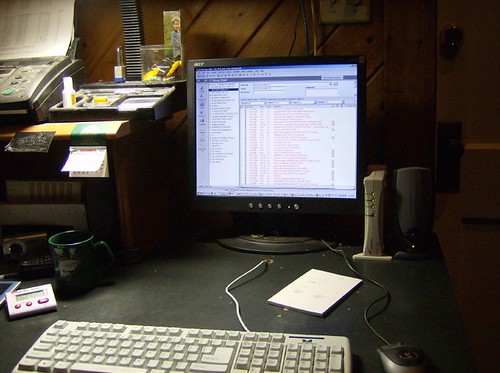 The time was about 3 a.m. and two of my friends were still online at MSN. Although their status indicated 'away', it is not an absolute tell tale sign that they were actually away. I know such trick. However, when they didn't return my message after several attempts, I knew they were indeed away - in bed. They have been 'away' daily at this hour for weeks and I wonder why they don't shut down their PCs when they go to bed. So I googled this subject and to my surprise, my friends are not living in a lonely planet - many people around the world leave their PCs on in the night. The pros and cons of doing so are debated feverently on the Internet. Each author educates the readers with their specific interest in mind. But why are people not shutting down their PCs when not in use? I shall cast the arugments aside and put in layman term the easier ways to decide what's best for youself.
The time was about 3 a.m. and two of my friends were still online at MSN. Although their status indicated 'away', it is not an absolute tell tale sign that they were actually away. I know such trick. However, when they didn't return my message after several attempts, I knew they were indeed away - in bed. They have been 'away' daily at this hour for weeks and I wonder why they don't shut down their PCs when they go to bed. So I googled this subject and to my surprise, my friends are not living in a lonely planet - many people around the world leave their PCs on in the night. The pros and cons of doing so are debated feverently on the Internet. Each author educates the readers with their specific interest in mind. But why are people not shutting down their PCs when not in use? I shall cast the arugments aside and put in layman term the easier ways to decide what's best for youself.The common hearsay to leave the PCs on 24/7 is that frequent turning on and off will cause a power surge and damage the hard disks. Unless your PC wears a pair of bell-bottom, modern PCS are designed to handle 40,000 on/off cycles before a failure i.e. 5 to 7 year life span of a computer. Stop listening to 'I heard a rumor' and do some fact-findings.
The other myth is that leaving the PC on uses lesser energy than turning it off. How can anyone buy this ridiculous conception that a small surge of power to turn the PC on is more than the long hours of keeping it on? Probably those who have to wait 5 minutes for the PC to boot up will.
Whether it is true that leaving the PC overnight is vulnerable to hackers' attacks or overheating, most people are listening only to their own ears. I turn off my PC whenever I don't use them and turn them on and off as often as I use them. It's a matter of saving electricty for me. According to SP Services, the norminal rating for computer is 300 watts and estimated electricity consumed/hour is 0.30 kwh. Let' me do a simple estimation: assuming my friends dozed off at 12 a.m that night and woke up at 8 a.m. the next day. The PC was on for 8 hours.
Estimated electricity consumed that night = 8 x 0.30 = 2.40kwh
Electricity tariff for domestic consumption = 20.52 cent/kwh
Estimated charges for that night = 2.4 x 20.52 = 49.25 cent
Estimaed charges for a month of 30 days = 49.25 cent x 30 = $14.78.
Although the most effective way to save electricity is to unplug the power from the socket (which is hard to practise because a modern home is a hybrid of appliances and gadgets), switching off the PC at night could at least save significant money. However, try telling those who download music and movies online about saving S15 per month on electricity bill and they will mock at you. With the collection of free music and movies that they wake up to the next morning by 'overworking' their PC, these pirates save hundreds of dollar every month.
At times, I do leave my PC on for a few hours even when I am not using it for convenience sake. However, I will put it into sleep mode instead of my Aussiebum screensaver (some can use up to 115 watts, half of PC's consumption), and turn off my monitor to save a few dollars. When it's time to sleep, I will definitely turn my PC off to save the Earth too. According to Live Earth's website, if one million PCs are shut down overnight, 45,000 tons of Carbon Dioxide (CO2) can be eliminated yearly.
If I can save money and our Mother Earth by simply shutting down my PC, I do not see a stronger reason to leave it on every night. Do you?
--------------------------------------------------------------------------------------------------------
More reading:
Leave It On or Shut It Down - PC Today.com
Do you need to turn off your PC at night? - microsoft.com
Should I shut down my PC at night? - yahoo.com (679 comments)
Cutting PC Energy Bills- Energy Awarness Campaign
Climate Crisis Solutions - Live Earth.org
What your PC is doing when you go to bed







No comments:
Post a Comment